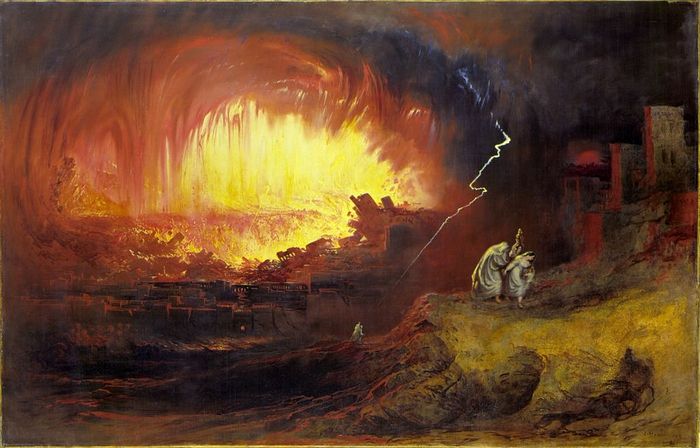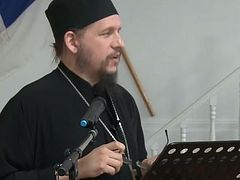 John Martin. The Destruction of Sodom And Gomorrah. 1852
John Martin. The Destruction of Sodom And Gomorrah. 1852
Some heresies wear their heretical nature like a big scarlet “H” on their foreheads, visible for all to see, and pretty much everyone can identify the idea as heretical as soon as they see it. Racism is one such heresy, inherent in National Socialism and the White Supremacist movement. Other heresies, however, are based on a convergence of presuppositions so interwoven into the fabric of our culture that their heretical nature goes largely undetected. These presuppositions are not denounced in our modern culture, but celebrated, often even by Christian theologians and academics.
The popularity of these heresies springs from the fact the underlying presuppositions on which they are based are so unquestioned in our culture that they have the force of unassailable dogma. These heresies therefore present themselves not as new ideas or novel options, but rather as self-evident truisms. (This in itself presupposes, of course, that one keeps one’s head and reading rigidly riveted to the modern era—as soon as one reads the Christian writing of earlier centuries, one instantly sees how novel these ideas really are.) Among these underlying modern presuppositions are: a conviction in the innate goodness and perfectibility of human nature, the conviction that the opinions of those in the Middle Ages (often derided under the term “medieval”) were barbarous and unworthy, the conviction that feelings of guilt are always unhealthy, the conviction that love is to be equated with tolerance, so that any intolerance is unloving by definition, and the conviction that anger and retaliation are always blameworthy and a sign of insufficient civilization. One could multiply examples expressing and celebrating these convictions, but such documentation is hardly necessary. As it turns out, Facebook and the liberal media are good for something after all.
We see all these underlying presuppositions at play in the new idea gaining ascendency in some Christian circles that God has no wrath, and that consequently all will be saved. Whether in the scholarly and multi-syllabic works of David Bentley Hart, or the more popular works of Rob Bell in his book Love Wins, or the tour-de-force of Brad Jersak with his insistence that the God of the Old Testament must be “unwrathed” to be understood in his A More Christlike God, we find the idea promoted that it is unworthy and inaccurate to declare that God has righteous wrath against sin and sinners. The argumentation is often pretty thin and the exegesis often atrocious, but it succeeds because it is based upon presuppositions which go unquestioned in our culture. Of course a God of love could never have wrath towards any of His creation! The Biblical texts which seem to suggest otherwise must be countered by other Biblical texts and then quietly put to one side. Gaps in the argument can be filled in by knocking down straw men (thoughtfully provided by fundamentalists), and by rhetorical flourishes and grand generalizations.
As soon as one emerges from the cultural cocoon of modern thought one sees that the concept of God’s wrath against sin was not regarded by the ancients as an embarrassment to be overcome and denied, but as something to be emphasized and celebrated. That is because the ancients did not share the modern presuppositions which make writers like Bell and Jersak so popular. The ancients also, perhaps more tellingly, did not share our culture’s loss of a sense of guilt, and our consequent squeamishness about declaring God’s wrath against sin.
Chrysostom, to cite but one example, believed that a good God must be wrathful against the impenitent who persist in sin and hardened evil. In his sermon on Romans 1:18, he said, “Since in general most men are not drawn so much by the promise of what is good as by the fear of what is painful, [Paul] draws them on both sides. For this cause too God not only promised a kingdom, but also threatened hell…So too does Paul direct his discourse. But observe him; Christ, he means, came to bring forgiveness, righteousness, life, yet not in any way, but by the Cross which is great and wonderful; He not only gave such things, but He also suffered such things. If you insolently scorn His gifts, then will the penalties await you…If [the one who questions this] is an unbeliever and a Greek [i.e. a pagan] him Paul silences by what he says here concerning the judgment of God… ‘for the wrath of God is revealed from heaven.’ And indeed even here [in this age] this often takes place in famines and pestilences and wars…For now [in this age] what takes place is for correction, but then [at the Judgment] for vengeance… Now, for many people, such things [i.e. famines, pestilences, and wars] usually seem to come not of the wrath from above, but of the malice of man. But then [at the end] the punishment from God shall be manifest, when the Judge, sitting upon the fearful tribunal, shall command some to be dragged to the furnaces, and some to the outer darkness and some to other inexorable and intolerable punishments.” Thus far Chrysostom, and his voice was hardly the only one who declared that a loving God will have wrath against those who have insolently scorned His gifts. Chrysostom here simply expressed the common teaching of the Church.
The Scriptures and the Fathers therefore agree: it is folly and the devil’s fancy to imagine that the Judge sitting upon the fearful tribunal could ever be “unwrathed”. What we really need is not some happy decryption key by which we can evade the clear and emphatic teaching of the Scriptures, but a humble heart by which we repent, and seek mercy from the Judge before it is too late.




Fr. Farley, I'm afraid you've mischaracterized the Christian universalist position. Rather than supposing that God has no wrath, and from there concluding universal salvation, we actually start with God's wrath—and from it deduce universalism. If God had no wrath, then eternal damnation might be possible.
As for the rest, this is a good read. Just recently I saw an article by an Orthodox prisoner minister suggesting that with God, there is no punishment. With God, there is nothing but open arms and hoping we make the right decision. Without realizing it - I'll assume - God becomes the passive God, unable to do anything but lob grace at us and hope for the best. We, in turn, are the true authors and powers of our own destinies. This was a good counterbalance.
"Racism" is a modern term consistently used to brand and condemn people of one particular race. I don't know why Father Lawrence chose to open with such a thing, but the rest of the article, as usual, is excellent. Thank you, Father.
The point is that Scripture speaks of God a certain way. We are obliged to conform our minds to the language and paradigms of God, not explain them away into an alternate reality, as post-Romanides theologians seen ever prone to do.
Are we brace enough to kick our sacred cows and tear down our idols?